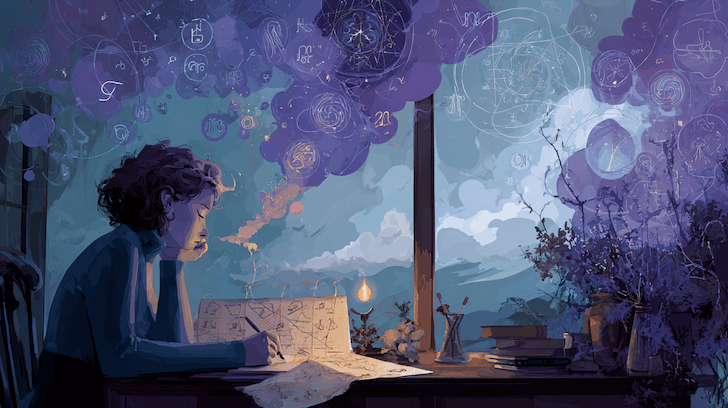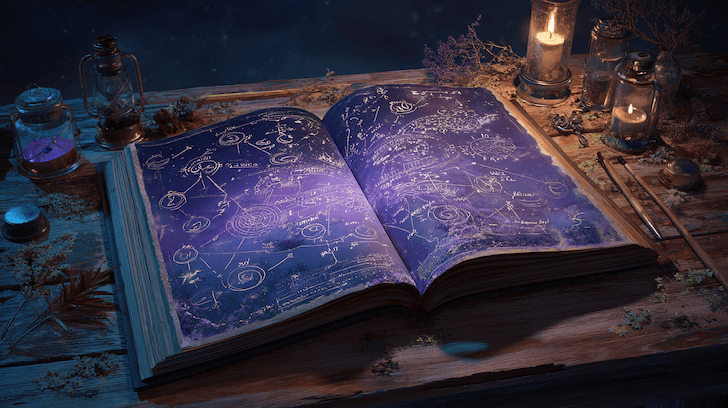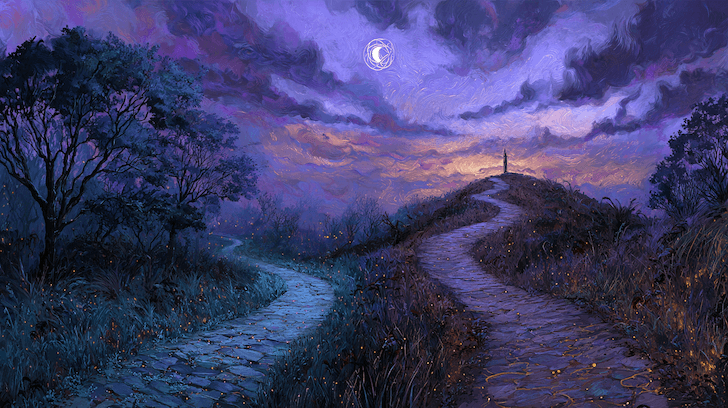Astrology and the Psyche

Astrology reads like psychology because both map patterned behavior. Planets name functions (drive, bond, imagine). Signs show style (direct, careful, fluid). Houses locate context (home, work, partnership). Aspects script the dialogue between parts of the self. The result is a language for how the psyche organizes experience—inside and out.
Think of the chart as a symbolic mirror: it doesn’t force behavior; it offers meaning frameworks that the psyche recognizes and plays out. Used well, it supports awareness, not excuses.
Why Symbols ‘Stick’
We remember stories better than spreadsheets. Astrology packages behavior into mythic images—the Warrior (Mars), the Lover (Venus), the Sage (Jupiter), the Senex (Saturn). These images operate like mental shortcuts: quick handles for complex feelings and choices. When a symbol fits, the psyche “clicks,” and you get language for what was previously wordless.
| Layer | What It Mirrors Psychologically | What to Notice |
|---|---|---|
| Planets | Basic drives and functions | Which ones are loud, which ones go quiet under stress |
| Signs | Style and motivation | Element (needs) + modality (tempo) |
| Houses | Life arenas | Where patterns show up most often |
| Aspects | Inner conversations | Support vs. tension between parts |
| Cycles | Memory and timing | Old themes resurfacing in new chapters |
Planets as Functions of Mind and Behavior
| Planet | Psychic Function | When It’s Healthy / When It’s Stuck |
|---|---|---|
| Sun | Coherent identity and purpose | Centered vitality / performative ego or burnout |
| Moon | Attachment and regulation | Soothing rhythms / mood loops, over-merging |
| Mercury | Perception and narrative | Clear thinking / spirals of worry or split attention |
| Venus | Bonding and value | Mutuality and taste / people-pleasing, avoidant pleasure |
| Mars | Agency and boundary | Decisive action / reactivity or paralysis |
| Jupiter | Meaning and growth | Hope, learning / overreach, magical thinking |
| Saturn | Structure and time | Mastery, grit / inhibition, self-criticism |
| Uranus | Change and authenticity | Liberation, originality / chaos, detachment |
| Neptune | Imagination and transcendence | Inspiration, compassion / fog, escapism |
| Pluto | Shadow and power | Depth, reclamation / control, obsession |
Signs as Styles the Psyche Prefers
Signs color the function with need + tempo.
| Element | Core Need | Feels Grounded When… |
|---|---|---|
| Fire | Impact and excitation | Acting boldly and being witnessed |
| Earth | Stability and craft | Building something tangible that lasts |
| Air | Meaning through exchange | Thinking aloud, connecting ideas and people |
| Water | Safety and bonding | Feeling seen, held, and emotionally attuned |
| Modality | Tempo | Psychic Move |
|---|---|---|
| Cardinal | Initiates | Start, decide, push |
| Fixed | Stabilizes | Hold, deepen, protect |
| Mutable | Adapts | Adjust, translate, blend |
Houses: Where the Psyche Meets Life
The psyche doesn’t live only in the head; it enacts itself in settings. Houses show where patterns cluster: 1st (self), 4th (roots), 7th (others), 10th (role), etc. When a topic keeps reappearing—career, family, intimacy—check the related house and its ruler for the script you keep rehearsing.
- Angles are loud: Ascendant/Descendant (self–other) and MC/IC (public–private) form the axes where identity is negotiated most visibly.
- Rulers route energy: If the 10th-house ruler sits in the 9th, vocation seeks meaning through learning, publishing, or travel.
Aspects: Inner Conversations
Aspects describe how parts of the psyche talk—or talk past each other.
| Aspect | Inner Dynamic | Helpful Reframe |
|---|---|---|
| Conjunction | Two functions fused | Name the pair’s shared goal so they cooperate |
| Square | Cross-purposes, friction | Define the skill the tension is asking for |
| Opposition | Projection, mirroring | Own your side; design rhythm across the axis |
| Trine | Ease, fluency | Use intentionally or it goes unnoticed |
| Sextile | Opportunity with effort | Make the small moves that unlock it |
Tension isn’t pathology. A square is often the engine of growth—the psyche’s way of asking for a new skill.
Cycles: Why Old Stories Reappear
Transits feel psychological because the mind is a pattern maker. When a planet revisits a natal point, the psyche recognizes the old story and tries to resolve it at a new level.
- Saturn cycles: Consolidation and accountability; growing a spine, not just a résumé.
- Jupiter cycles: Meaning-making; say yes with wisdom, not inflation.
- Outer-planet transits: Uranus wakes, Neptune blurs, Pluto deepens—each invites a specific kind of awareness practice.
Shadow, Projection, and Relationship
What we don’t own, we tend to meet in others. Oppositions and hard aspects to the Descendant often symbolize traits we disown and then fall in love with—or fight. Naming the archetype reduces compulsive projection and increases genuine choice.
- Venus–Neptune: Idealization → practice reality checks alongside reverie.
- Mars–Saturn: Harsh inner critic → set fair rules so effort isn’t self-punishment.
- Sun–Pluto: Power struggles → choose clean power: boundaries, consent, clarity.
Dream, Image, and Creative Making
Neptune, Moon, and Venus synchronize with image-based knowing: dreams, music, ritual, art. Treat these as valid data. When image shifts, behavior follows—often faster than through analysis alone. The psyche learns by rehearsing preferred futures in imagination and then acting them out.
How to Use This Lens (Without Fatalism)
- Name the function, not the fate. Say “my Mars wants agency” instead of “my Mars makes me angry.”
- Track the arena. Note the house where the pattern shows up—change the setting, you change the script.
- Rehearse a better scene. For a square, define the missing skill and practice it in low-stakes contexts.
- Time reflection, not doom. Use transits as journaling prompts and boundary checks, not verdicts.
- Look for repetition. When multiple placements echo the same message, that’s your curriculum for the year.
Astrology doesn’t replace therapy or agency. It gives a shared vocabulary so psyche and life can talk to each other—and you can choose your next move with clearer eyes.
Astrology and Jungian Archetypes

Fate vs. Free Will in Astrology

Get Your Birth Chart
Calculate your complete astrological chart with precise astronomical data based on your birth time and location
Generate Chart